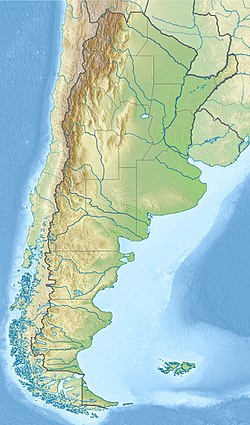Chachao Formation
| Chachao Formation | |
|---|---|
| Stratigraphic range: Valanginian ~ | |
| Type | Geological formation |
| Unit of | Mendoza Group |
| Underlies | Agrio Formation |
| Overlies | Vaca Muerta |
| Lithology | |
| Primary | Limestone |
| Other | Mudstone |
| Location | |
| Coordinates | 35°00′S 69°42′W / 35.0°S 69.7°W |
| Approximate paleocoordinates | 33°48′S 33°00′W / 33.8°S 33.0°W |
| Region | Mendoza Province |
| Country | Argentina |
| Extent | Neuquén Basin |
The Chachao Formation is a geological formation in the Mendoza Province in northern Patagonian Argentina. It is Valanginian in age and is predominantly marine, being deposited at a time of marine transgression in the Neuquén Basin, and predominantly consists of carbonate rocks.
The formation belongs to the Mendoza Group, sediments deposited on the Mendoza Shelf. The formation overlies the Vaca Muerta and is overlain by the Agrio Formation.
Description
A typical feature of the Chachao Formation is the dominance of oysters, many of them quite large e.g. Aetostreon latissimun, and others small, e.g. Ceratostreon minos. Different kinds of semi-infaunal soft bottom dwellers and swimming bivalves were recognized. Additional forms are represented by gastropods, ammonites (Olcostephanus curacoensis), and ichnofossils such as Thalassinoides sp. Serpulids are represented by the colonial Sarcinella sp., and the solitary form Parsimonia sp. The highly diverse fauna of the analyzed succession, made up with numerous stenohaline elements such as echinoderm, bryozoa, ammonite as well as serpulids and typical marine pelecypods indicate a fully marine environment.[1]
Fossil content
The formation has provided the following fossils:[2]
References
- ^ a b Chachao Coquina - Taphofacies 3 at Fossilworks.org
- ^ Chachao Formation at Fossilworks.org
Bibliography
- Geologic formations of Argentina
- Lower Cretaceous Series of South America
- Cretaceous Argentina
- Valanginian Stage
- Limestone formations
- Mudstone formations
- Open marine deposits
- Shallow marine deposits
- Neuquén Basin
- Fossiliferous stratigraphic units of South America
- Paleontology in Argentina
- Geology of Mendoza Province

